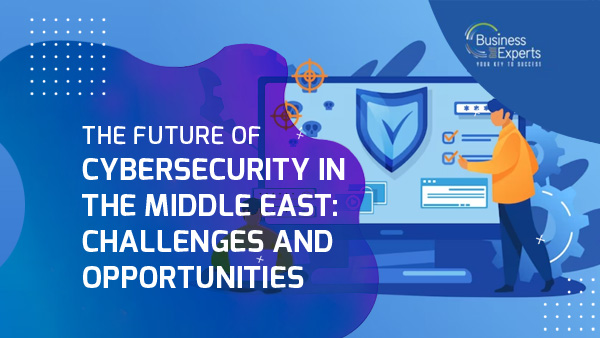The Future of Cybersecurity in the Middle East – Cybersecurity has emerged as a critical concern in the digital age, and the Middle East is no exception. As technology continues to advance and digital transformation accelerates across various sectors, the region faces a multitude of cybersecurity challenges. However, the Middle East also possesses immense potential for growth and development in the field of cybersecurity. The Middle East cybersecurity market was estimated at around $11 billion in 2020, and it was projected to reach $22 billion by 2025, growing at a CAGR of around 15%.
In this article we review the trends and share the current status:
Rising Cyber Threats
The Middle East has experienced a surge in cyber threats, including state-sponsored attacks, ransomware, and financial fraud. The increasing threat landscape has driven organizations to invest in robust cybersecurity measures.
The Middle East has witnessed a significant rise in cyber threats in recent years. Nation-state attacks, such as the Shamoon and Triton attacks, have targeted critical infrastructure, while ransomware campaigns have affected both public and private entities. As digital connectivity expands, threat actors are becoming increasingly sophisticated, necessitating robust cybersecurity measures. The future of cybersecurity in the Middle East relies on adapting to this evolving threat landscape through enhanced intelligence, threat sharing, and proactive defence strategies.
Focus on Critical Infrastructure Protection
Governments in the Middle East have recognized the importance of safeguarding critical infrastructure. Such as energy, utilities, and transportation systems, from cyber threats. There is an emphasis on implementing cybersecurity measures to protect these vital assets.
Countries like the United Arab Emirates (UAE), Saudi Arabia, and Qatar are making substantial financial commitments to bolster their cybersecurity infrastructure. These investments encompass developing advanced security technologies, establishing dedicated cybersecurity agencies, and fostering partnerships with international organizations. The influx of funding and resources indicates a positive trajectory for the future of cybersecurity in the region.
Investments in cybersecurity by Middle East governments:
- United Arab Emirates (UAE):
The UAE has been actively investing in cybersecurity initiatives. In 2020, the UAE government allocated approximately AED 1.4 billion (around $381 million) for its cybersecurity budget.
-
- The UAE has established the National Electronic Security Authority (NESA) to oversee the country’s cybersecurity strategy and implementation.
- The Dubai Electronic Security Center (DESC) has been playing a crucial role in enhancing cybersecurity within Dubai and has received significant investments.
- Saudi Arabia:
- Saudi Arabia has recognized the importance of cybersecurity and has made substantial investments in this field. In 2019, the Saudi Arabian government allocated around SAR 2.5 billion (approximately $666 million) to enhance cybersecurity capabilities.
- The Saudi Arabian Monetary Authority (SAMA) has been actively investing in cybersecurity measures to protect the financial sector.
- The Saudi Federation for Cybersecurity, Programming, and Drones (SAFCSP) has been established to develop cybersecurity skills and promote innovation in the field.
- Qatar:
- Qatar has been investing in cybersecurity to protect critical infrastructure and its digital ecosystem. In 2018, the Qatari government announced an investment of QAR 1 billion (around $275 million) to strengthen its cybersecurity capabilities.
- The Qatar National Cyber Security Strategy focuses on developing a resilient cybersecurity framework and fostering partnerships between public and private entities.
- Bahrain:
- Bahrain has been proactive in enhancing its cybersecurity capabilities. In 2019, the Bahraini government allocated BHD 19.6 million (approximately $52 million) to strengthen cybersecurity measures.
- The Bahrain National Cybersecurity Strategy aims to establish Bahrain as a regional hub for cybersecurity and enhance cybersecurity readiness across various sectors.
Regulatory Frameworks
Governments in the region are developing and enforcing cybersecurity regulations and frameworks to protect sensitive data and ensure compliance.
Some noteworthy regulatory initiatives and frameworks implemented by Middle East governments:
- United Arab Emirates (UAE):
- Dubai Cyber Security Law: In 2019, Dubai implemented a comprehensive cybersecurity law that mandates cybersecurity standards and practices for entities operating in critical sectors, such as finance, transportation, and energy.
- UAE Information Assurance Standards (IAS): The UAE government has developed the IAS to provide guidelines and requirements for the protection of critical information and infrastructure. It covers areas such as risk management, incident response, and secure development practices.
- Saudi Arabia:
- Saudi Arabia Cybersecurity Law: In 2019, Saudi Arabia enacted the Cybersecurity Law, which aims to protect the country’s critical infrastructure and sensitive data. It imposes cybersecurity obligations on government agencies, critical infrastructure operators, and service providers.
- Personal Data Protection Law: In 2020, Saudi Arabia introduced the Personal Data Protection Law to regulate the processing and protection of personal data. It establishes rights and obligations related to data privacy and imposes penalties for non-compliance.
- Qatar:
- Qatar National Cyber Security Law: Qatar introduced the National Cyber Security Law in 2014, which sets out cybersecurity requirements and obligations for entities operating within Qatar. It focuses on protecting critical infrastructure, ensuring incident reporting, and establishing penalties for cybercrimes.
- Personal Data Protection Law: In 2016, Qatar implemented the Personal Data Protection Law, which regulates the collection, processing, and transfer of personal data. It outlines principles for data protection, consent requirements, and penalties for violations.
- Bahrain:
- Bahrain Personal Data Protection Law: Bahrain implemented the Personal Data Protection Law in 2018 to protect the privacy and security of personal data. The law defines rights and obligations related to data protection, establishes consent requirements, and provides guidelines for data transfers.
- Bahrain Cybersecurity Law: Bahrain introduced the Cybersecurity Law in 2018 to protect critical infrastructure and combat cyber threats. It mandates cybersecurity standards, incident reporting, and establishes penalties for cybercrimes.
Regional Cybersecurity Hubs
Several countries in the Middle East, such as the United Arab Emirates (UAE), Saudi Arabia, and Qatar, are emerging as regional cybersecurity hubs. These hubs attract international cybersecurity companies, foster innovation, and provide platforms for collaboration and knowledge exchange.
Cloud Security
With the adoption of cloud services and digital transformation initiatives, there is a growing need for robust cloud security solutions. Organizations are investing in cloud security technologies and services to protect their data and applications in the cloud.
While cloud security remains number 1 priority the main goal remains to secure critical infrastructure sectors, including energy, finance, and transportation, are prime targets for cyber-attacks. Securing these sectors is crucial for the stability and economic growth of the Middle East. Governments are actively investing in securing critical infrastructure, including the implementation of advanced threat detection systems, secure communication networks, and continuous monitoring solutions. The future of cybersecurity in the Middle East hinges on the effective protection of these vital sectors.
Threat Intelligence and Analytics
There is an increasing focus on leveraging threat intelligence and advanced analytics to detect and respond to cyber threats effectively. Organizations are adopting solutions that provide real-time threat intelligence and predictive analytics capabilities.
Artificial Intelligence (AI) and Machine Learning (ML) have become indispensable tools in combating cyber threats. The Middle East is increasingly adopting AI and ML technologies to augment its cybersecurity capabilities. These technologies enable organizations to detect anomalies, identify patterns, and respond to threats in real-time. Moreover, AI-driven threat intelligence platforms enhance incident response and enable proactive defence measures. The integration of AI and ML in cybersecurity will continue to expand, fostering a more secure digital ecosystem in the Middle East.
Skill Development and Partnerships
One of the significant challenges facing the Middle East is the shortage of skilled cybersecurity professionals. To address this issue, governments and private entities are focusing on promoting cybersecurity education and training programs. Initiatives such as specialized university courses, vocational training, and cybersecurity competitions are being implemented to bridge the skills gap. Furthermore, the region is exploring collaborations with international institutions and companies to benefit from their expertise. By nurturing a skilled workforce, the Middle East can ensure its readiness to tackle future cybersecurity challenges.
Increased Adoption of Managed Security Services
Organizations are increasingly turning to managed security service providers (MSSPs) to outsource their cybersecurity needs. This allows them to leverage the expertise of specialized providers and enhance their security posture.
Strengthening Public-Private Partnerships
Collaboration between the public and private sectors is crucial for an effective cybersecurity framework. In the Middle East, governments are actively engaging with private organizations to share threat intelligence, develop cybersecurity policies, and foster skill development. Public-private partnerships (PPPs) facilitate knowledge exchange, resource sharing, and the development of robust cybersecurity regulations. The future of cybersecurity in the Middle East relies heavily on the strength and effectiveness of these partnerships.
Conclusion:
As the Middle East continues to embrace digital transformation, the future of cybersecurity in the region holds both challenges and opportunities. To mitigate evolving cyber threats, governments and organizations must invest in advanced technologies, foster public-private partnerships, bridge the skills gap, and secure critical infrastructure. By adopting a proactive and collaborative approach, the Middle East can strengthen its cybersecurity posture, ensuring a safe and secure digital landscape for its citizens and businesses.
To know more you can contact us at info@bemea.com. Follow us on our LinkedIn to stay up-to-date on this solution.











